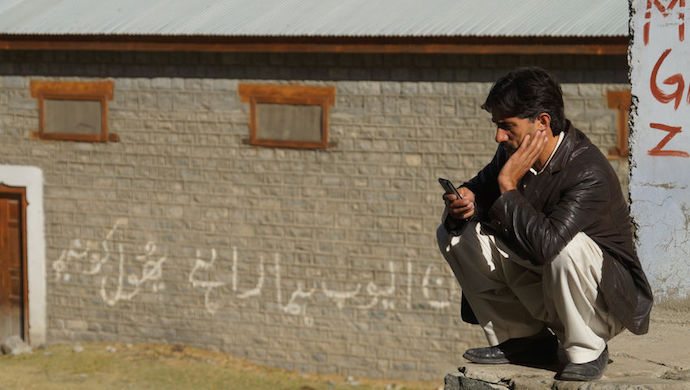With increased mobile access and hunger for connectivity, this segment is also the largest untapped consumer base in the world

The manufacturing industry typically cater to the needs of people whose buying power can keep the wheels of industry oiled and running. This was the trend until 2004 when C.K. Prahalad introduced the ‘Bottom of the Pyramid’ (BoP) theory in his book, titled The Fortune at the Bottom of the Pyramid.
Put simply, the BoP social class consist of people who earn less than US$1,500 a year. This segment is also the largest untapped consumer base in the world.
Prahalad’s radical idea influenced top executives to devise business strategies for a new breed of consumers sitting at the bottom of the wealth pyramid. In the case of Pakistan, mobile phone penetration in the most remote areas of the country created its own unique breed of BoP consumers holding immense business potential.
Presently, a large portion of the Pakistani population has cozied up to mobile phones, which are becoming cheaper by the day, thus making it the perfect marketing outreach tool in possession of BoP consumers. Now, the manufacturing industry just has to step in and start educating people about the benefits of products offered by various companies and how those can improve quality of life for the common user.
Teaching consumers to aspire for quality living
Pakistan has a sizeable BoP consumer base that is mostly illiterate. So, the best way to engage and educate people is through the use of mobile phones that have better reach than any other communications tool in the country. This will not only allow businesses to educate people about convenience, but it will also allow manufacturers to engage in BoP projects in Pakistan with relative ease.
Also read: Why is Pakistan not producing Unicorns like other Asian countries?
A thriving telecommunications sector
Pakistan’s telecommunication sector has vastly assisted the manufacturing industry to extend its reach to the most remote areas of the country. The previously unbelievable opportunity has been brought about by none other than the mobile phone.
Mobile phone users in Pakistan are in the millions, and so are the number of 3G/4G active connections. According to Pakistan Telecommunication Authority, the number of users on mobile phone internet networks (3G/4G) has doubled to 29.53 million in the fiscal year ending in June 2016, a marked increase from 14.6 million in July 2015.
The above mentioned numbers are proof of a bright future for BoP marketing in Pakistan. As SMS marketing has become an important outreach strategy in this day and age, the scope of doing business with BoP consumers is increasing for big companies.
BoP initiatives undertaken by Pakistani companies
Reckitt Benckiser Pakistan launched the first pilot project, named ‘Project Hope’ in Dhoru village near Sargodha. The plan was to create awareness among masses regarding the company and then developing products and services that are specifically produced for the low-income BoP consumers. The project was received well by the target audience, who felt more informed after the workshops.
Similarly, Pakistan-based property portal Zameen.com found its own unique way to try to change consumer habits through the Zameen Agency Connect event. The company invites real estate agents to the event where top management not only meets the agents, but also informs them about new technologies being utilised in the global real estate industry. By taking such steps, modern companies ensure that consumers remain on the same page to take forward the education initiative a notch further.
Common challenges in a developing country
It will take great commitment on official and private levels to change consumer habits in Pakistan, since the low level of literacy here restricts the flow of effective communication. Breaking through the age-old social and cultural norms is another challenge for companies trying to introduce new ideas effectively to low-income consumers.
Also read: Rocket Internet travel site Jovago carves out a niche in Pakistan despite negative sentiments
Another common challenge faced by multinationals in Pakistan is the low percentage of women participants in workshops conducted by these organisations due to social restrictions. There have been cases in the past wherein BoP initiatives aimed at women were met with resistance from local men who dominate the social hierarchy in the South Asian country. Navigating through this problem will require a lot of patience and tact from the government and allied stakeholders.
Investing time in the education of the masses in e-commerce is also important in helping the layman understand the benefits of this industry on the economy of Pakistan.
Today, mobile phones have enabled instant connectivity among people scattered across the world. The manufacturing industry in Pakistan will do quite well if it realises the immense business potential of BoP consumers who are armed with mobile phones and hungry for connectivity.
—-
Want to be part of the ecosystem?
Register for your Echelon Asia Summit access pass now! Enjoy +10% off Echelon Asia Summit Startup, Investor and Corporate passes just for being our favourite e27 reader.
The views expressed here are of the author’s, and e27 may not necessarily subscribe to them. e27 invites members from Asia’s tech industry and startup community to share their honest opinions and expert knowledge with our readers. If you are interested in sharing your point of view, submit your post here.
Featured Image Copyright: pulpitis / 123RF Stock Photo
The post Bottom of the Pyramid sector in Pakistan can open new opportunities through increased mobile engagement appeared first on e27.